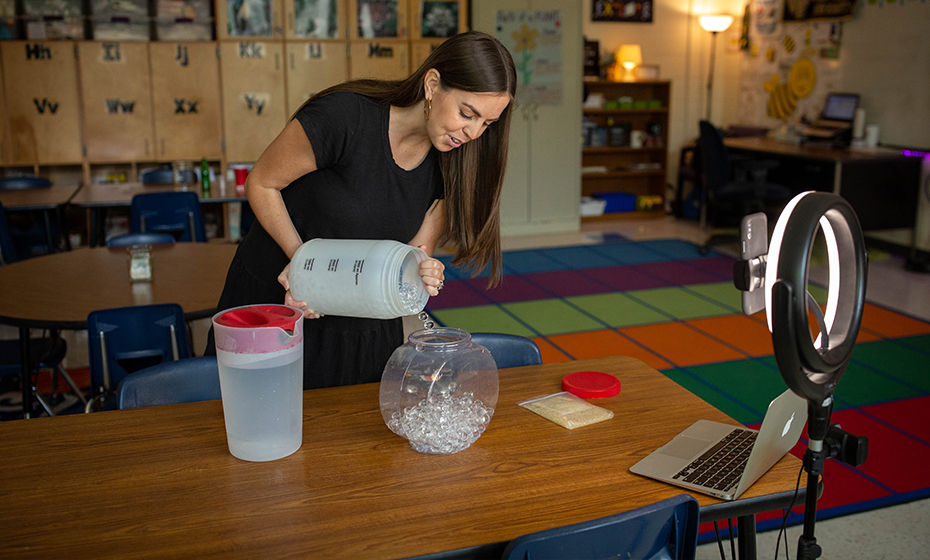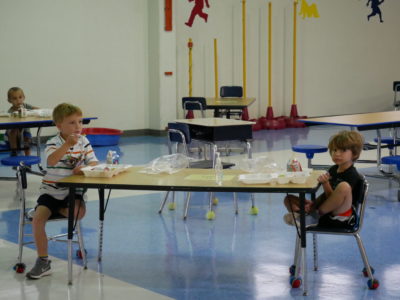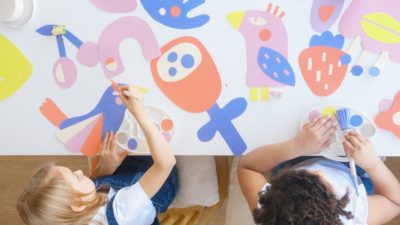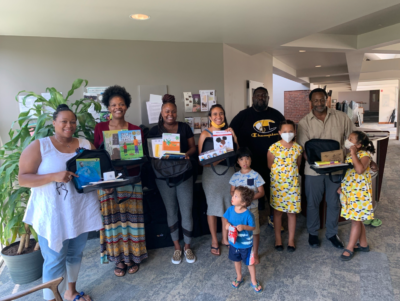
Solar systems, skeletons, and stacks of supplies line the walls in Nancy Bullard’s classroom. Bullard — better known as Mrs. B — is the science lab teacher at Huntingtowne Farms Elementary School in Charlotte, North Carolina. Every student from kindergarten through fifth grade comes to her class at least once a week for hands-on science lessons.
“This is the place,” Bullard said, “where you get to blow stuff up and get messy.”
But how do you do that when teaching through a computer screen?
For Mrs. B, the answer was social media.
When classrooms went virtual in March 2020, Bullard and other teachers noticed a drop in attendance. Bullard knew her students were on social media and decided to try posting videos of science experiments on TikTok.
“My hope was that maybe my kids are scrolling through TikTok,” she said, “and my face pops up and they come to class the next day and say, ‘Hey, Mrs. B, I saw you on TikTok!’”
It worked.
By the end of the school year, she had 1,000 followers on her channel @mrs.b.tv. Today, more than 2.6 million students, teachers, and science enthusiasts follow her for easy experiments they can do at home or in their own classrooms.
“I’m just blown away that it has drawn the attention of so many people.”
One of her most popular videos — with 5.6 million likes — is Bullard dipping a spoonful of cocoa powder into a cup of water. As she pulls the spoon out, like magic, the cocoa powder stays dry. Bullard explains that it’s not magic, but that cocoa powder repels water because it’s hydrophobic, a concept usually learned in chemistry.
Bullard started with simple experiments that could be done with items most students had at home. As the school year progressed, teachers made packets of take-home assignments that parents picked up once a month. With the help of nonprofit Classroom Central, Bullard made STEM kits (science, technology, engineering and math) with supplies for experiments they could do together.
Classroom Central provides teachers in the six counties surrounding Charlotte with supplies so they don’t have to spend as much of their own money for their students. Duke Energy is a long-time supporter of the nonprofit. Every year, employees participate in a school supply drive.
In addition to employee donations, Duke Energy Foundation has given more than $150,000 to Classroom Central since 2015. Last school year, Classroom Central gave teachers $5.3 million worth of supplies and established an online store with curbside pickup during the pandemic.
“I think I can speak on behalf of all the teachers who took advantage of Classroom Central — this school year in particular,” Bullard said, “it’s overwhelmingly helpful when you’re not having to spend your own money and your students are well provided for.”
Bullard packed her STEM kits with an assortment of items from hot chocolate to balloons that would help her students learn about energy. When it was time for class, sitting in front of her laptop in an empty classroom, Bullard took supplies out of her kit while her students did the same at their homes. Together, they built a catapult with popsicle sticks, rubber bands, and a plastic spoon to launch marshmallows into hot chocolate — a much more entertaining way to learn about forces of motion than a textbook.
In addition to being fun, it’s effective. Studies show that hands-on lessons improve retention. Bullard said her goal is to make science fun for her students so they’ll have a better understanding of the concepts and maybe develop scientific interests.
TikTok has helped her do that and more by giving millions a glimpse into her classroom.
“The goal of this classroom is to get kids involved in hands-on science,” she said. “That was my goal during the pandemic. That was my goal before the pandemic, and it is still my goal.”
Throughout the pandemic, Duke Energy supported teachers like Mrs. B. as they found new ways to teach and engage students. Duke Energy donated more than $8 million to COVID-relief efforts in the seven states it serves including more than $800,000 to K-12 organizations like Classroom Central in North Carolina.
In Raleigh, $20,000 helped Marbles Kids Museum launch Marbles Learn & Play to provide online learning opportunities for students. The online content gives parents hands-on STEM activities they can do at home with their children.
“Since COVID-19 forced us to close the museum to the public, we’ve had to reduce staff and delay major projects,” said Sally Edwards, CEO of Marbles Kids Museum. “This flexible funding from Duke Energy helped us pivot to connect virtually with our community during closure and implement new sustainability practices to ensure we emerge from this crisis viable and ready to spark imagination, discovery, and learning through play.”
Recommended reading



